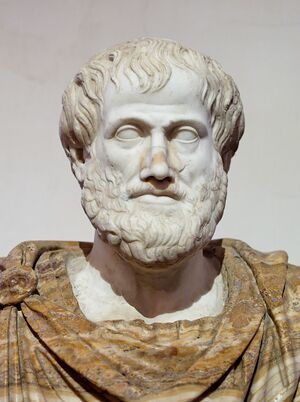Logic (nonfiction): Difference between revisions
Jump to navigation
Jump to search

No edit summary |
No edit summary |
||
| Line 1: | Line 1: | ||
[[File:Aristotle_-_Roman_copy_after_Greek_bronze_by_Lysippos.jpg|thumb|Bust of [[Aristotle (nonfiction)|Aristotle]]. Marble, Roman copy after a Greek bronze original by Lysippos from 330 BC; the alabaster mantle is a modern addition.]]'''Logic''' (from the Ancient Greek: λογική, ''logike'') is the use and study of valid reasoning. | [[File:Aristotle_-_Roman_copy_after_Greek_bronze_by_Lysippos.jpg|thumb|Bust of [[Aristotle (nonfiction)|Aristotle]]. Marble, Roman copy after a Greek bronze original by Lysippos from 330 BC; the alabaster mantle is a modern addition.]]'''Logic''' (from the Ancient Greek: λογική, ''logike'') is the use and study of valid reasoning. | ||
The study of logic features most prominently in the subjects of philosophy, [[mathematics (nonfiction)]], and [[computer science]]. | The study of logic features most prominently in the subjects of philosophy, [[mathematics (nonfiction)|mathematics]], and [[Computer science (nonfiction)|computer science]]. | ||
In the West, logic was established as a formal discipline by [[Aristotle (nonfiction)]], who gave it a fundamental place in philosophy. | In the West, logic was established as a formal discipline by [[Aristotle (nonfiction)|Aristotle]], who gave it a fundamental place in philosophy. | ||
Logic is often divided into three parts, Inductive reasoning, Abductive reasoning, and Deductive reasoning. | Logic is often divided into three parts, Inductive reasoning, Abductive reasoning, and Deductive reasoning. | ||
| Line 14: | Line 14: | ||
== Fiction cross-reference == | == Fiction cross-reference == | ||
* [[Aristotle]] | |||
* [[Gnomon algorithm]] | * [[Gnomon algorithm]] | ||
* [[Mathematics]] | * [[Mathematics]] | ||
Revision as of 16:24, 23 June 2016

Bust of Aristotle. Marble, Roman copy after a Greek bronze original by Lysippos from 330 BC; the alabaster mantle is a modern addition.
Logic (from the Ancient Greek: λογική, logike) is the use and study of valid reasoning.
The study of logic features most prominently in the subjects of philosophy, mathematics, and computer science.
In the West, logic was established as a formal discipline by Aristotle, who gave it a fundamental place in philosophy.
Logic is often divided into three parts, Inductive reasoning, Abductive reasoning, and Deductive reasoning.
In the News
Fiction cross-reference
Nonfiction cross-reference
External links:
- Logic @ wiki.karljones.com